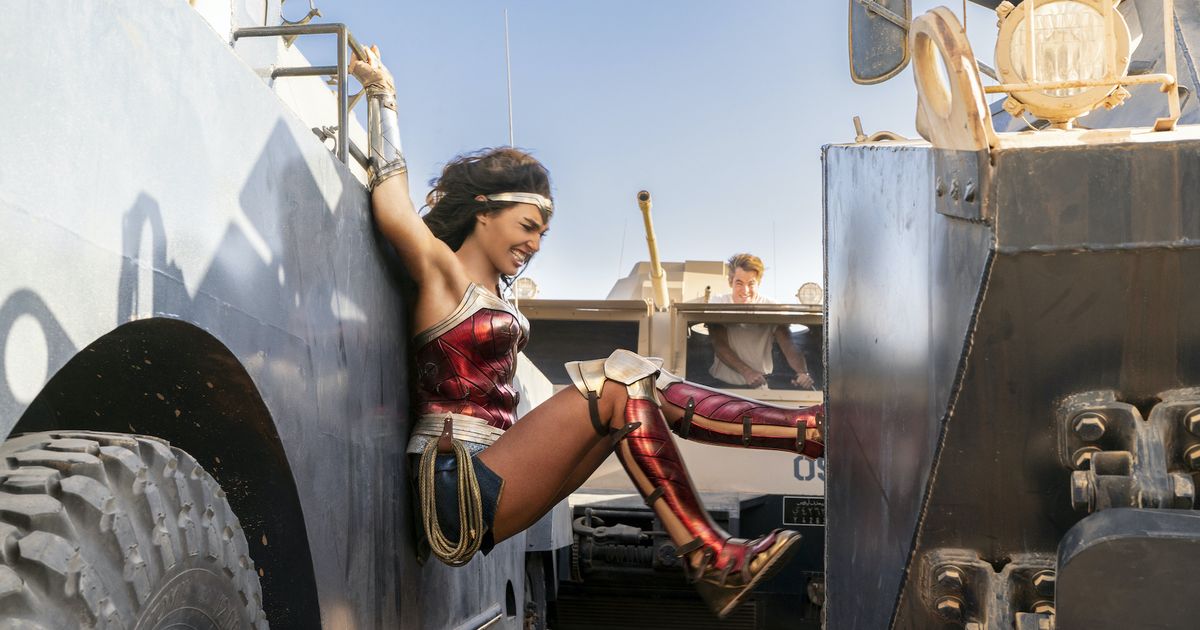
For the most part, Wonder Woman 1984 feels completely disconnected from any larger efforts to build out the DC cinematic universe. There’s no present-day framing device, no time-traveling messages from the Flash, no wink-wink visits to Wayne Enterprises or S.T.A.R. Labs.
However, there is a callback to another DC film in the big climax, if you listen closely — and the harder you think about it, the sadder it gets. (Needless to say, spoilers ahead.)
In the final confrontation between Diana (Gal Gadot) and Max Lord (Pedro Pascal), she delivers a stirring speech to all of humankind in hopes of inspiring them to renounce the wishes that have wreaked such havoc across the planet.
“You must be the hero. Only you can save the day,” she tells them. And she makes clear that she, too, has made the sacrifice, and therefore knows what it is she’s asking them to give up: “Because you’re not the only one who has suffered. Who wants more. Who wants them back. Who doesn’t want to be afraid anymore, or alone, or frightened, or powerless. ‘Cause you’re not the only one who imagined a world where everything is different.”
As she talks, the score behind her swells. But it’s not her signature tune. It’s a version of “Beautiful Lie,” the somber instrumental piece that plays over the opening scene of Batman v Superman: Dawn of Justice. You know, the one that cuts between a young Bruce attending his parents’ funeral, and watching them get murdered right in front of him.
[embedded content]
Though Batman v Superman doesn’t specify exactly when the killings take place, a theater marquee advertising Excalibur suggests they’re somewhere in early 1981. Put that all together, and it’s easy to imagine young orphan Bruce Wayne listening to Diana’s words — the tears in her voice as she accepts that Steve is really gone, her insistence that “the truth is beautiful” anyway, her call for heroes to step up and do the right thing in the face of great hardship.
Maybe he’s even hearing them after having wished for his own parents to return from the dead, and now finds himself in the horrible situation of having to give them back. After all, if there’s one thing we know about Batman, it’s that their deaths were his foundational trauma.
Granted, this is pure speculation on our part. Aside from the music, there’s nothing in this film linking Batman to Wonder Woman 1984, and Warner Bros. hasn’t said much about when, or if, we’ll ever see Batman and Wonder Woman on screen together again. There’s a good chance this possible connection is never confirmed or mentioned in the movies.
The music connects the Diana of 1984 to the Diana of the future.
And for her part, director Patty Jenkins claimed on a Zoom group call with Mashable that the choice was simply a matter of the song fitting the scene. “Beautiful Lie” had been used as a temp score during editing, with the intention of adding in original music later on. After several efforts to write something new, Jenkins said, Hans Zimmer, who composed the scores for both movies, eventually suggested she just keep it in.
“It just got to the point where Hans was like, ‘Why are we doing this? It’s from the DC universe. This is a song that existed in their movies. Why would it not come back?'” she recalled. “So that was it. It’s such a beautiful track, it’s the same composer, it’s something that was written for this world, and so it just stuck.”
But the choice of song, intentionally or not, gives the scene an extra bittersweet edge. In Wonder Woman 1984, “Beautiful Lie” leads into a flashback montage outlining Max’s own miserable childhood, filled with bullying and abuse. The scenes are offered as an explanation for why Max is the way he is, an attempt to empathize with a man whose pain and anger have caused him to lash out. In doing so, however, they also set up an implicit comparison between Max and Bruce, both traumatized boys who grew up to be powerful men — as if to remind us that there’s another way to respond to hurt.
And the music connects the Diana of 1984, the bruised and heartbroken warrior, to the Diana of the future, as laid out in Batman v Superman and Justice League. In those, her choice to sacrifice Steve turns out not to have been in vain. She’s saved humankind countless times in between, and continues fighting still — always striving toward that better world she imagines in her monologue, one in which the people of the world feel they’re “loved and seen and appreciated, finally.”
Wonder Woman 1984 is now streaming on HBO Max.
